Oral Hygiene
Healthy teeth and gums make it easy for you to eat well and enjoy good food. There are a number of problems that can affect the health of your mouth, but good care should keep your teeth and gums strong.
Tooth Decay
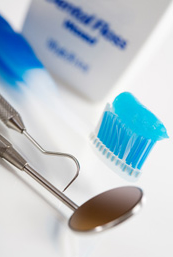
Teeth are covered in a hard, outer coating called enamel. Every day, a thin film of bacteria called dental plaque builds up on your teeth. The bacteria in plaque produce acids that can begin to harm enamel. Over time, the acids can cause a hole in the enamel. This hole is called a cavity. Brushing and flossing your teeth can protect you from decay, but once a cavity happens, a dentist has to fix it.
You can protect your teeth from decay by using fluoride toothpaste. If you are at a higher risk for tooth decay (for example, if you have a dry mouth because of medicines you take), you might need more fluoride. Your dentist or dental hygienist may give you a fluoride treatment during an office visit, or the dentist may tell you to use a fluoride gel or mouth rinse at home.
Dental Cleanings (scale and polish)
Dental cleanings involve removing plaque (soft, sticky, bacteria infested film) and tartar (calculus) deposits that have built up on the teeth over time. Your teeth are continually bathed in saliva which contains calcium and other substances which help strengthen and protect the teeth. While this is a good thing, it also means that we tend to get a build-up of calcium deposits on the teeth. This chalky substance will eventually build up over time, like lime scale in a pipe or kettle. Usually it is tooth colored and can easily be mistaken as part of the teeth, but it also can vary from brown to black in color. If the scale, or calculus (tartar) is allowed to accumulate on the teeth it will unfortunately provide the right conditions for bacteria to thrive next to the gums. The purpose of the cleaning and polishing is basically to leave the surfaces of the teeth clean and smooth so that bacteria are unable to stick to them and you have a better chance of keeping the teeth clean during your regular home care. The professional cleaning of teeth or prophylaxis (or prophy for short)is performed by a licensed Dental Hygienist It’s a Greek word which means “to prevent beforehand” – in this case, it helps prevent gum disease.
Gum Diseases
Gum disease begins when plaque builds up along and under the gum line. This plaque causes infections that hurt the gum and bone that hold teeth in place. Sometimes gum disease makes your gums tender and more likely to bleed. This problem, called gingivitis, can often be fixed by daily brushing and flossing.
A more severe form of gum disease, called periodontitis, needs to be treated by a dentist. If not treated, this infection can ruin the bones, gums, and other tissues that support your teeth. Over time, your teeth may have to be removed.
Stages of Periodontal Disease
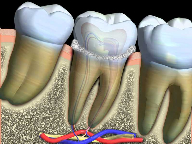
Gingivitis is the first stage of Periodontal disease. Plaque, (a sticky substance filled with bacteria) settles along the gum line of the teeth and causes the gums to swell, become red in appearance and bleed.
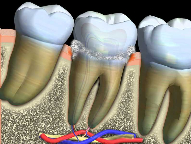
If the plaque is not removed, bacteria settles around the roots of the teeth and starts to destroy the supporting bone. The bone loss is not reversible. The gums become infected and pull away from the teeth, forming pockets.
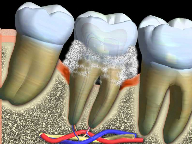
As the pockets become deeper and the infection progresses, more bacteria accumulate and further bone loss occurs. The gums shrink away and the teeth start to become loose and may shift. Many people suffer from bad breath at this stage.
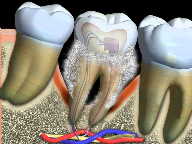
When periodontal disease has reached its advanced stage, painful abscesses can form in the gum. There is very little bone support left and the teeth are loose. In most cases, teeth that have reached this stage require extraction.
To prevent gum disease
- Brush your teeth twice a day with fluoride toothpaste.
- Floss once a day.
- Visit your dentist regularly for a checkup and cleaning.
- Eat a well-balanced diet.
- Quit smoking. Smoking increases your risk for gum disease.
Cleaning Your Teeth and Gums
There is a right way to brush and floss your teeth. Every day:
- Gently brush your teeth on all sides with a soft-bristle brush and fluoride toothpaste.
- Use small circular motions and short back-and-forth strokes.
- Take the time to brush carefully and gently along the gum line.
- Lightly brush your tongue to help keep your mouth clean.
People with arthritis or other conditions that limit hand motion may find it hard to hold and use a toothbrush. Some helpful ideas are:
- Use an electric or battery-operated toothbrush.
- Slide a bicycle grip or foam tube over the handle of the toothbrush.
- Buy a toothbrush with a larger handle.
- Attach the toothbrush handle to your hand with a wide elastic band.
- You also need to clean around your teeth with dental floss every day. Careful flossing will take off plaque and leftover food that a toothbrush can’t reach. Be sure to rinse after you floss.
How to Floss
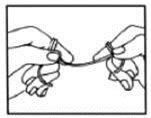
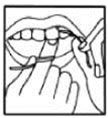
upper teeth.
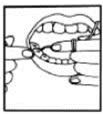
See your dentist if brushing or flossing causes your gums to bleed or hurts your mouth. If you have trouble flossing, a floss holder may help. Ask your dentist to show you the right way to floss.
Dentures
Sometimes, false teeth (dentures) are needed to replace badly damaged teeth. Partial dentures may be used to fill in one or more missing teeth. Dentures may feel strange at first. In the beginning, your dentist may want to see you often to make sure the dentures fit. Over time, your gums will change shape and your dentures may need to be adjusted or replaced. Be sure to let your dentist handle these adjustments.
When you are learning to eat with dentures, it may be easier if you:
- Start with soft, non-sticky food.
- Cut your food into small pieces.
- Chew slowly using both sides of your mouth.
Be careful when wearing dentures because it may be harder for you to feel hot foods and drinks or notice bones in your mouth from your food.
Keep your dentures clean and free from food that can cause stains, bad breath, or swollen gums. Brush them every day with a denture care product. Take your dentures out of your mouth at night and put them in water or a denture-cleansing liquid.
Dry Mouth
Dry mouth happens when you don’t have enough saliva, or spit, to keep your mouth wet. Many common medicines can cause dry mouth. That can make it hard to eat, swallow, taste, and even speak. Dry mouth can cause tooth decay and other infections of the mouth.
There are some things you can try that may help with dry mouth. Try sipping water or sugarless drinks. Don’t smoke and avoid alcohol and caffeine. Sugarless hard candy or sugarless gum may help. Your dentist or doctor might suggest that you use artificial saliva to keep your mouth wet, or they may have other ideas on how to cope with dry mouth.
Oral Cancer
Cancer of the mouth can grow in any part of the mouth or throat. It is more likely to happen in people over age 40. A dental checkup is a good time for your dentist to look for signs of oral cancer. Pain is not usually an early symptom of the disease. Treatment works best before the disease spreads. Even if you have lost all your natural teeth, you should still see your dentist for regular oral cancer exams.
You can lower your risk of getting oral cancer in a few ways:
- Do not use tobacco products—cigarettes, chewing tobacco, snuff, pipes, or cigars.
- If you drink alcohol, do so only in moderation.
- Use lip balm with sunscreen.
Why Recall Appointments Are Important
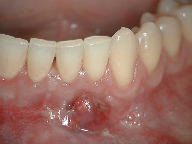
Regular recall appointments are important to help detect problems that may exist in your mouth. This abscess which is not painful was found. If left untreated, the infection may spread causing loss of teeth.
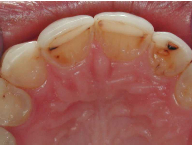
Recurrent decay (decay around existing fillings) can be detected during recall exams. If left untreated, the decay will spread underneath the filling and the tooth may require extensive treatment.
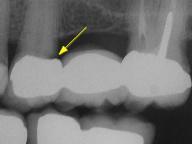
Regular x-rays help to find problems that may not be visible. Decay has been found underneath this bridge (yellow arrow). If left untreated, the tooth and the entire bridge may be lost.
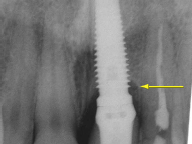
Bone loss around an implant may also be found on an x-ray (yellow arrow). This type of bone loss is not painful, but if left untreated, the implant may be lost.
